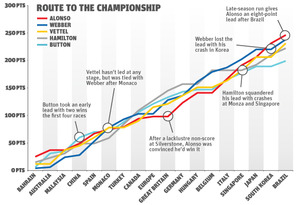Evil-site-scraper-update-and-reader-notice
Dan Duncan advocated the "don't get mad, get even" strategy for Yves' Naked Capitalism:
While you sort it out, always include several internal internal links to other posts. As long as you have internal links to your other work, then at least the scraped content will get you deep links to your back pages.
Other technological considerations: Instead of a simple HTAccess denial--ie simply denying access from the offending IP address-- do an HTAccess "re-write". By doing this, you don't block access...rather, you send the asshole "false" content of your choice. It could be a HUGE file of jibberish like "hy^&GBHBDFNLG#$&H%" ...or even better send them "The Best of DownSouth"! ["Please Yves of Naked Cap, we won't ever scrape your site again. Please, just-make-it-stop! We're begging you!"] [Of course, you are more than welcome to send them my commentary as well.]
Or, you could send the scraper into an infinite loop with something like this in HTAccess:
RewriteCond %{REMOTE_ADDR} ^123.123.123
RewriteRule ^(.*)$ http://domain.tld/feed
Replace the IP address with that of the scraper and replace the feed URL with the feed from the scraper's site. That would actually be amusing. If you do this, please let us know what happens.
Here are some other good blacklist options from a helpful site:
perishablepress.com/press/2009/02/03/eight-ways-to-blacklist-with-apaches-mod_rewrite/
Also, beyond the Cease and Desist, you need to file DMCA Reports with the Search Engines.
www.mcanerin.com/EN/articles/copyright-03.asp
And finally, since they are scraping to game Google go to Google:
googlewebmastercentral.blogspot.com/2008/06/duplicate-content-due-to-scrapers.html

